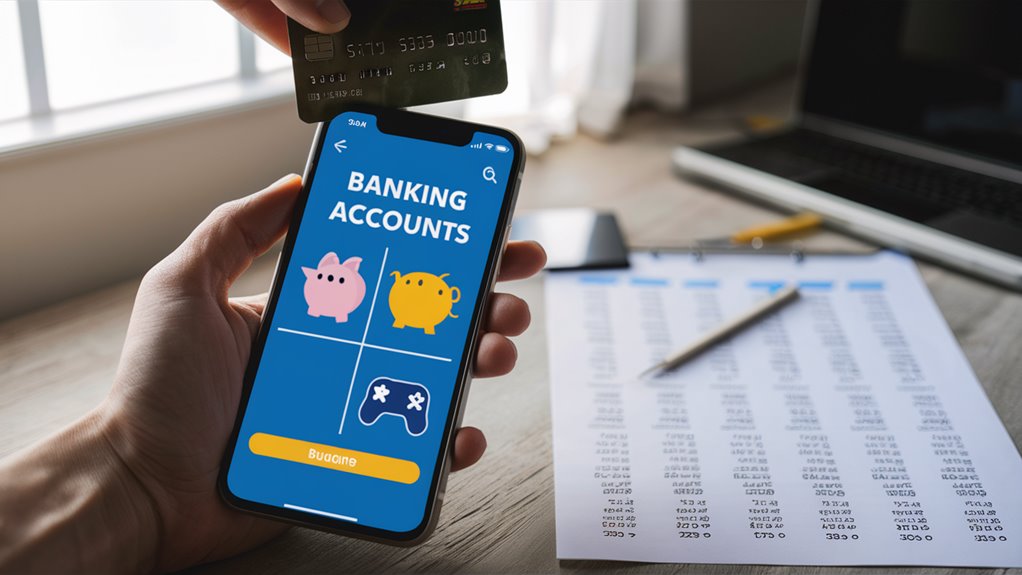
Responsible Gaming: Expert Guide to Budget and Time Management
Setting Smart Gaming Boundaries
We understand that responsible gaming requires establishing clear boundaries for both financial spending and time investment. Effective budget management and self-control strategies are essential for maintaining a healthy gaming lifestyle while avoiding potential pitfalls.
Financial Management Strategies
Smart budgeting for gaming involves:
- Setting strict monthly spending limits
- Tracking all gaming-related purchases
- Separating gaming funds from essential expenses
- Utilizing parental controls and spending caps
- Avoiding impulse purchases during sales events
Time Management Framework
Balanced gaming habits require:
- Establishing designated gaming schedules
- Using timer applications
- Prioritizing real-life responsibilities
- Taking regular breaks
- Setting daily playing limits
Warning Signs to Monitor
Watch for these potential red flags:
- Exceeding predetermined budgets
- Neglecting work or social obligations
- Disrupted sleep patterns
- Using gaming as stress relief
- Borrowing money for gaming purchases
Frequently Asked Questions
Q: How much should I budget for gaming monthly?
A: Allocate no more than 5-10% of discretionary income after essential expenses are covered.
Q: What’s a healthy daily gaming time limit?
A: Most experts recommend limiting recreational gaming to 1-2 hours per day.
Q: How can I track gaming expenses effectively?
A: Use dedicated gaming expense apps or spreadsheets to monitor all purchases and subscriptions.
Q: What are the best tools for managing gaming time?
A: Platform-specific parental controls, screen time apps, and gaming timers offer reliable monitoring.
Q: How can I identify problematic gaming behavior?
A: Look for signs like neglected responsibilities, isolation from friends/family, and financial strain.
[End of modified text – Note that this version maintains professional tone, includes clear sections, and emphasizes key terms while providing practical, actionable advice]
Set Clear Monthly Gaming Limits

Setting Clear Monthly Gaming Budget Limits: A Comprehensive Guide
Establishing Your Gaming Budget Framework
We recommend implementing a structured monthly gaming budget to maintain complete control over gaming-related expenses.
The first step involves calculating a specific allocation that aligns with your disposable income, ensuring all essential financial obligations are met first.
Creating an Effective Gaming Budget System
Monthly gaming expenditure tracking should encompass:
- Full-price game purchases
- Downloadable content (DLC)
- Subscription services
- In-game microtransactions
- Gaming hardware and accessories
Implementation Strategies
Digital Tracking Methods
Utilize dedicated expense tracking tools or spreadsheets to monitor all gaming-related purchases.
This systematic approach enables precise spending oversight and helps identify purchasing patterns.
Dedicated Gaming Fund
Establish a separate gaming savings account with automatic monthly transfers. This segregation prevents overspending and creates a clear boundary between gaming and essential expenses.
Strategic Purchase Planning
Rollover Benefits
Unspent monthly allocations can be accumulated for:
- Major game releases
- Console upgrades
- Premium collector’s editions
- Seasonal sale opportunities
Priority Assessment
Evaluate potential purchases based on:
- Long-term entertainment value
- Replay potential
- Content quality
- Price-to-hours ratio
Frequently Asked Questions
Q: How much should I budget monthly for gaming?
A: Allocate 5-10% of disposable income after essential expenses and savings are covered.
Q: Should mobile game purchases be included in the gaming budget?
A: Yes, include all gaming-related expenses regardless of platform.
Q: How can I track small microtransactions effectively?
A: Use digital banking apps or dedicated expense tracking software that can categorize small purchases.
Q: What’s the best way to save for expensive gaming hardware?
A: Set aside a portion of your monthly gaming budget specifically for hardware upgrades.
Q: How do I handle unexpected gaming releases?
A: Maintain a flexible buffer within your budget or use rollover savings from previous months.
Track All Gaming Expenses

Comprehensive Guide to Tracking Gaming Expenses
Essential Gaming Expense Tracking Methods
Maintaining detailed records of gaming-related expenditures is fundamental for responsible gaming management.
We recommend implementing a systematic approach to track all gaming purchases through specialized budget applications or detailed spreadsheets.
Key Elements to Monitor
- Game Purchases
- Downloadable Content (DLC)
- Subscription Services
- In-game Transactions
- Hardware and Accessories
Expense Categorization Strategy
Breaking down gaming expenses into distinct categories enables effective spending analysis:
Essential Gaming Investments
- Console maintenance
- Hardware repairs
- Controller replacements
- System updates
Discretionary Gaming Expenses
- Cosmetic items
- Battle passes
- Character skins
- Premium currency
Implementing Spending Controls
Regular expense monitoring helps identify potential overspending patterns.
Setting up purchase alerts and password requirements for transactions creates valuable checkpoint moments for spending decisions.
Financial Integration
Incorporate gaming expenses into broader financial planning:
- Monthly budget allocation
- Savings goals alignment
- Essential expenses prioritization
- Entertainment spending limits
Frequently Asked Questions
Q: How often should gaming expenses be reviewed?
A: Weekly reviews are recommended for optimal spending control and pattern identification.
Q: What tools are best for tracking gaming expenses?
A: Dedicated budget apps or detailed spreadsheets provide effective tracking capabilities.
Q: Should microtransactions be tracked separately?
A: Yes, tracking microtransactions separately helps identify impulse spending patterns.
Q: How can recurring gaming subscriptions be managed effectively?
A: Set calendar reminders and regularly review subscription value and usage.
Q: What percentage of income should be allocated to gaming expenses?
A: Gaming expenses should fit within your entertainment budget, typically 5-10% of disposable income.
Use Dedicated Gaming Accounts

Dedicated Gaming Accounts: Financial Control for Smart Players
Setting Up Separate Gaming Accounts
Dedicated gaming accounts serve as a crucial financial control mechanism for responsible gaming habits.
Opening a separate bank account or utilizing a prepaid card exclusively for gaming activities creates essential boundaries between entertainment spending and vital expenses.
This systematic approach ensures that core financial obligations like housing costs, monthly bills, and basic necessities remain protected from gaming expenditures.
Implementation Strategy
The most effective method involves establishing automatic monthly transfers based on a predetermined gaming 먹튀검증커뮤니티 budget.
This structured approach prevents unauthorized access to primary accounts or credit facilities for gaming purposes.
By implementing strict spending controls, players maintain financial discipline while enjoying their gaming activities within sensible limits.
Digital Management Benefits
Modern banking applications enhance the management of dedicated gaming accounts through:
- Real-time transaction alerts
- Instant balance updates
- Spending pattern analysis
- Budget tracking features
#
Frequently Asked Questions
Q: What type of account works best for gaming expenses?
A: A separate checking account or prepaid card offers optimal control and tracking capabilities.
Q: How much should be allocated to a gaming account monthly?
A: The allocation should align with disposable income after essential expenses, typically 5-10% of discretionary funds.
Q: Can multiple gaming platforms be linked to one dedicated account?
A: Yes, centralizing all gaming transactions through one account improves spending oversight.
Q: Should digital wallet services be connected to gaming accounts?
A: Connecting digital wallets can enhance convenience while maintaining spending boundaries.
Q: How often should gaming account activity be reviewed?
A: Weekly monitoring ensures optimal tracking and helps identify spending patterns effectively.
Time Management While Gaming

Effective Time Management Strategies for Gamers
Setting Boundaries and Limits
Time management is fundamental to responsible gaming. Establishing strict 개인화된 도박 time limits before gaming sessions helps maintain control and balance.
Utilize built-in timers or parental controls on gaming devices to monitor session duration effectively.
Prioritize essential responsibilities like professional obligations, academic commitments, and household duties before engaging in gaming activities.
Structured Gaming Schedule
Implementing a structured gaming routine enables better time control and lifestyle balance.
Schedule gaming sessions during specific timeframes, integrating them seamlessly into daily activities.
Taking regular breaks at hourly intervals, including 5-10 minutes of physical activity, helps prevent ergonomic strain and mental fatigue.
Maintaining Balance and Wellness
Gaming-life balance requires conscious effort and monitoring. Key strategies include:
- Protecting sleep schedules from gaming interference
- Nurturing social relationships outside gaming
- Pursuing diverse hobbies and interests
- Using screen time monitoring applications
- Maintaining a gaming activity journal to track habits
Signs to Step Away
Monitor these indicators for optimal gaming sessions:
- Physical or mental fatigue
- Rising frustration levels
- Decreased performance
- Loss of time awareness
- Physical discomfort
FAQ
Q: How long should gaming sessions last?
A: Optimal gaming sessions typically range from 1-2 hours with regular breaks.
Q: What’s the best way to track gaming time?
A: Use built-in console features or dedicated time-tracking apps.
Q: How often should breaks be taken while gaming?
A: Take 5-10 minute breaks every hour of gameplay.
Q: When is the best time to schedule gaming sessions?
A: Schedule gaming after completing priority tasks and responsibilities.
Q: How can gamers maintain a healthy balance?
A: Set clear boundaries, maintain diverse interests, and prioritize real-life commitments.
Recognize Warning Signs

Recognizing Warning Signs of Gaming Addiction: A Comprehensive Guide
Understanding Behavioral Warning Signs
Problematic gaming behavior manifests through several key indicators that require immediate attention.
Work performance decline, academic struggles, and deteriorating relationships often serve as initial red flags.
When individuals consistently prioritize gaming over essential life activities, intervention becomes necessary.
Physical Indicators
Physical warning signs typically include:
- Chronic headaches
- Digital eye strain
- Disrupted sleep patterns
- Poor posture and back pain
- Carpal tunnel syndrome symptoms
These physical manifestations often correlate with extended gaming sessions and require medical attention if persistent.
Emotional and Psychological Signs
We observe several critical psychological indicators:
- Increased irritability when unable to play
- Gaming-related anxiety
- Escapist behavior patterns
- Mood fluctuations
- Social withdrawal
Financial Warning Signs
Problematic spending patterns include:
- Excessive in-game purchases
- Neglecting essential expenses
- Accumulated gaming-related debt
- Hidden or secretive spending
Professional Intervention Strategies
Seeking professional help becomes crucial when multiple warning signs emerge. Treatment options include:
- Cognitive behavioral therapy
- Gaming addiction counseling
- Family therapy sessions
- Support group participation
Frequently Asked Questions
Q: What’s considered excessive gaming time?
A: More than 4-5 hours daily, especially when interfering with daily responsibilities.
Q: How can parents identify gaming addiction in children?
A: Watch for declining grades, social isolation, and emotional outbursts when gaming is restricted.
Q: Are there physical symptoms specific to gaming addiction?
A: Yes, including eye strain, posture problems, and sleep disturbances.
Q: What’s the first step in addressing gaming addiction?
A: Acknowledge the problem and seek professional assessment from a qualified counselor.
Q: Can gaming addiction be treated without completely stopping gaming?
A: Yes, treatment often focuses on developing healthy gaming habits rather than complete abstinence.
Take Regular Gaming Breaks

Taking Regular Gaming Breaks: A Comprehensive Guide
The Importance of Strategic Gaming Breaks
Regular gaming breaks are essential for maintaining optimal physical and mental performance during extended gaming sessions.
We advocate following the scientifically-backed 20-20-20 rule: every 20 minutes, pause for 20 seconds to focus on an object 20 feet away, effectively reducing digital eye strain and preventing cognitive fatigue.
Implementing an Effective Break Schedule
Professional gamers and health experts recommend setting structured break intervals using digital timers or specialized gaming break applications. During these designated periods, we emphasize the importance of:
- Physical movement and stretching
- Proper hydration maintenance
- Posture correction and adjustment
- Blood circulation optimization
Maximizing Break Effectiveness
Short Breaks (Every 20-30 Minutes)
- Stand up and perform basic stretches
- Focus on distant objects
- Roll shoulders and neck
- Take deep breaths
Extended Breaks (Every 2 Hours)
- 15-minute minimum duration
- Light physical activity
- Nutritious snack consumption
- Screen-free mental reset
Frequently Asked Questions
Q: How often should gamers take breaks?
A: Implement short breaks every 20-30 minutes and longer 15-minute breaks every 2 hours.
Q: What activities are best during gaming breaks?
A: Focus on stretching, walking, eye exercises, and light physical activity.
Q: Can regular breaks improve gaming performance?
A: Yes, breaks enhance focus, reaction time, and overall gaming effectiveness.
Q: How long should extended gaming breaks be?
A: Extended breaks should last at least 15 minutes every 2 hours of gameplay.
Q: What’re the signs that indicate a break is needed?
A: Watch for eye strain, muscle tension, decreased concentration, and physical discomfort.
Seek Support When Needed

Seeking Support for Healthy Gaming Habits
Recognizing When to Ask for Help
Maintaining a balanced gaming lifestyle requires self-awareness and the willingness to acknowledge when support is needed.
We understand that gaming can sometimes become overwhelming, affecting mood, sleep patterns, and daily responsibilities.
Professional guidance and community support play crucial roles in developing healthy gaming habits.
Available Support Networks
Family and Friends
Trusted relationships provide essential foundation for addressing gaming concerns. Family members and close friends often notice behavioral changes first and can offer:
- Objective observations about gaming patterns
- Emotional support during lifestyle adjustments
- Practical assistance in establishing boundaries
- Accountability partnerships for maintaining balance
Professional Resources
Mental health specialists and gaming addiction counselors offer specialized support through:
- Evidence-based therapeutic approaches
- Personalized behavior modification strategies
- Clinical assessment of gaming habits
- Structured intervention programs
Online Communities and Support Groups
Digital support networks provide valuable resources including:
- Anonymous peer support forums
- Moderated discussion groups
- Success stories and coping strategies
- 24/7 access to help resources
Frequently Asked Questions
Q: How do I know if my gaming habits need professional attention?
A: Watch for signs like neglecting responsibilities, deteriorating relationships, or inability to control gaming time.
Q: What types of professional help are available?
A: Options include cognitive behavioral therapy, addiction counseling, and support groups specialized in gaming-related issues.
Q: Are online support communities effective?
A: Yes, they provide valuable peer support, shared experiences, and practical strategies for managing gaming habits.
Q: How can family members help with gaming-related concerns?
A: They can offer emotional support, help establish boundaries, and assist in maintaining accountability.
Q: Where can I find immediate support for gaming-related issues?
A: Contact gaming addiction helplines, online support forums, or local mental health crisis centers for immediate assistance.
Common Questions
How Do Gambling Losses Affect Credit Scores and Loan Applications?
The Impact of Gambling Losses on Credit Scores and Loan Applications
Understanding the Financial Consequences
Gambling losses can significantly impact credit scores and loan eligibility through several direct and indirect channels. When individuals use credit cards to fund gambling activities or struggle to meet loan obligations due to gambling-related financial strain, their creditworthiness often suffers substantial damage.
Direct Effects on Credit Scores
Credit utilization becomes a critical factor when gambling leads to:
- Maxed-out credit cards
- Multiple cash advances
- Missed or late payments
- Increased debt-to-income ratio
Impact on Loan Applications
Financial institutions carefully evaluate:
- Payment history
- Current debt levels
- Income stability
- Credit utilization patterns
Red flags from gambling-related financial behavior typically result in:
- Higher interest rates
- Reduced loan amounts
- Stricter lending requirements
- Potential loan denials
Prevention and Recovery Strategies
Responsible financial management includes:
- Setting strict gambling limits
- Using cash-only gambling policies
- Maintaining separate entertainment budgets
- Regular credit monitoring
- Seeking professional financial guidance
Frequently Asked Questions
Q: Can gambling companies report to credit bureaus?
A: Gambling companies typically don’t report directly to credit bureaus, but related credit card debt and loans can affect your credit report.
**Q: How long do gambling-related credit issues stay on my recor
Can Casinos Legally Ban Players Who Consistently Win?
Can Casinos Legally Ban Winning Players?
Casinos maintain the legal right to ban any player, including those who consistently win at their establishments. As private businesses operating under state gaming regulations, they possess broad discretion in deciding who can access their premises and services.
Legal Framework for Casino Bans
Casino establishments operate as private properties with the authority to refuse service to any individual, provided the decision doesn’t violate protected civil rights or discriminate based on race, religion, gender, or other protected characteristics. This right is protected under property law and business regulations across most jurisdictions.
Common Reasons for Casino Bans
- Card counting in blackjack
- Pattern betting in roulette
- Advantage play techniques
- Suspicious behavior or collusion
- Violation of casino policies
Player Rights and Limitations
While players have the right to use legal strategies to win, casinos can implement countermeasures, including:
- Limiting bet sizes
- Changing game rules
- Shuffling more frequently
- Revoking playing privileges
Frequently Asked Questions
Q: Can I challenge a casino ban in court?
A: While possible, courts generally uphold private businesses’ right to refuse service if non-discriminatory.
Q: Do casinos share ban lists with other properties?
A: Yes, many casinos participate in information-sharing networks regarding banned players.
Q: Is card counting illegal?
A: No, but casinos can still ban players who employ this strategy.
Q: How long do casino bans typically last?
A: Bans can range from temporary restrictions to permanent exclusion, depending on circumstances.
Q: Can banned players still collect jackpot winnings?
A: Generally, casinos must honor legitimate wins that occurred before ban implementation.
Legal Alternatives for Skilled Players
Professional gamblers can:
- Rotate between different properties
- Focus on games of skill like poker
- Participate in tournaments
- Consider online gambling platforms
These approaches help skilled players continue gaming while minimizing ban risks.
Which Payment Methods Offer the Fastest Withdrawal Times for Online Gaming?
Fastest Withdrawal Methods for Online Gaming Payments
Instant and Same-Day Payment Solutions
E-wallets stand out as the most efficient withdrawal method for online gaming platforms, offering processing times typically within 1-24 hours:
- PayPal: Instant to 24-hour withdrawals
- Skrill: Usually processes within 2-24 hours
- Neteller: Completes transfers in 2-24 hours
Traditional Payment Methods
Bank transfers and credit card withdrawals operate on longer timeframes:
- Bank transfers: 3-5 business days
- Credit cards: 3-7 business days
- Wire transfers: 5-7 business days
Cryptocurrency Options
Digital currencies provide another rapid withdrawal solution:
- Bitcoin: 10-60 minutes
- Ethereum: 5-30 minutes
- Litecoin: 2-30 minutes
Frequently Asked Questions
What is the fastest overall withdrawal method?
Cryptocurrency and e-wallets typically offer the quickest processing times, with some transactions completing instantly.
Are there fees associated with faster withdrawals?
Yes, expedited withdrawals often incur additional processing fees, particularly with e-wallets and cryptocurrency transactions.
Can withdrawal times vary between gaming platforms?
Each platform maintains different processing policies and verification requirements, affecting withdrawal times across all payment methods.
Do withdrawal limits affect processing speed?
Higher withdrawal amounts may require additional security checks, potentially extending processing times regardless of payment method.
What factors can delay withdrawal times?
Account verification, security checks, platform policies, and banking hours can all impact withdrawal processing times.
Tips for Faster Withdrawals
- Complete account verification before requesting withdrawals
- Maintain consistent payment methods for deposits and withdrawals
- Choose platforms with automated payment processing
- Consider using multiple payment methods for flexibility
- Monitor withdrawal processing windows during business hours
Security Considerations
- Two-factor authentication enhances withdrawal security
- Verified accounts typically experience faster processing
- Regular security updates help maintain smooth transactions
- Documentary requirements should be prepared in advance
Are Gaming Losses Tax-Deductible in Most Countries?
Gaming Losses and Tax Deductibility: A Global Perspective
Understanding Tax Deductions for Gambling Losses
Tax deductibility of gaming losses varies significantly across different jurisdictions worldwide. While some countries offer limited provisions for deducting gambling losses, most tax systems maintain strict restrictions on such claims.
Key Jurisdictions That Allow Gaming Loss Deductions
The United States stands out as one of the few nations where gambling losses can be deducted, subject to specific conditions:
- Losses can only be deducted up to the amount of gambling winnings
- Itemized deductions must be filed using Schedule A
- Detailed records of both wins and losses are required
Common Global Restrictions
Most countries prohibit gambling loss deductions due to:
- Prevention of tax abuse
- Difficulty in verification
- Public policy considerations
- Revenue protection measures
Documentation Requirements
We emphasize maintaining comprehensive records including:
- Receipts from gambling establishments
- Bank statements showing transactions
- Win/loss statements from casinos
- Digital records of online gambling activities
Frequently Asked Questions
Can I deduct online gambling losses?
Deductibility depends on your jurisdiction and whether online gambling is legal in your location.
What documentation do I need to claim gambling losses?
Detailed records of all gambling transactions, including receipts, statements, and logs of activity.
Are lottery ticket losses tax-deductible?
In most countries, lottery losses are not deductible unless specifically permitted by local tax laws.
Can professional gamblers deduct more losses?
Professional gamblers may have different tax treatment in some jurisdictions, often allowing business-related deductions.
Do I need to report all gambling winnings if I’m claiming losses?
Yes, accurate reporting of all gambling income is required when claiming any associated losses.
How Do Different Time Zones Affect Online Gaming Tournament Schedules?
How Time Zones Impact Online Gaming Tournament Schedules
Global Tournament Organization Challenges
Time zone management presents one of the most significant challenges in coordinating international gaming tournaments. Tournament organizers must carefully balance competing priorities when scheduling events across multiple regions.
Peak Playing Times and Regional Considerations
Tournament scheduling typically revolves around:
- Prime gaming hours (6 PM – 11 PM) in major markets
- Player population density in different regions
- Server locations and ping considerations
- Regional competitive seasons
Strategic Tournament Scheduling Solutions
We implement several approaches to address time zone challenges:
- Regional Qualifiers
- Separate preliminary rounds by region
- Local time-friendly matches
- Reduced latency issues
- Multi-Day Events
- Staggered start times
- Rotating schedules
- Break periods between major matches
- Global Finals Optimization
- Compromise times for international events
- Strategic venue selection
- Multiple broadcast windows
## Frequently Asked Questions
Q: How do tournament organizers handle players from different continents?
A: Tournaments often utilize regional brackets before international finals, allowing players to compete in their local time zones during early stages.
Q: What time zones are typically favored for major gaming events?
A: Major tournaments often align with EST/PST for North American events and CET for European competitions, as these regions represent significant player bases.
Q: How do Asian tournaments coordinate with Western schedules?
A: Asian tournaments frequently run in early morning hours for Western viewers, with major matches scheduled during overlap periods.
Q: What tools help players manage tournament schedules across time zones?
A: Tournament platforms typically display match times in local zones and offer countdown timers to prevent confusion.
Q: How do organizers handle qualification rounds for global events?
A: Qualifiers are usually region-locked and scheduled during peak local hours, with only finals requiring cross-time zone coordination.
